牛津高二英语
- 格式:ppt
- 大小:2.00 MB
- 文档页数:45
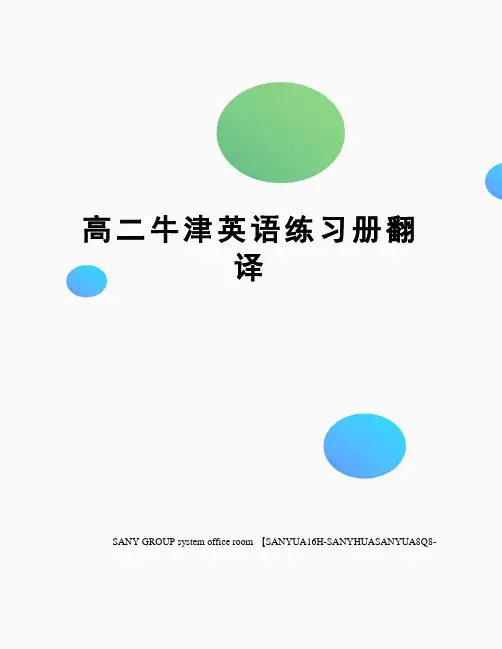
高二牛津英语练习册翻译SANY GROUP system office room 【SANYUA16H-SANYHUASANYUA8Q8-高二牛津英语练习册翻译第一课翻译: 1.你一旦作出承诺,就必须信守诺言。
(promise, keep one’s word)Once you have made a promise, you must keep your word. 2.一切都准备就绪,他们迫不及待地要启动这个项目。
(be dying to)Having prepared everything, they are dying to get the programme started.(After preparing everything, they are dying to get the programme started.)When/ After/ As soon as they have prepared everything, they are dying to get the programme started.They have prepared everything, and they are dying to get the program started. 3.乘客可以在飞机起飞前一个半小时开始办理登机手续。
(check in)Passengers can/ may begin to check in an/ one hour and a half before the flight/ the plane takes off. 4.说实话,我不太赞同你昨天在会议上提出的建议。
(to be honest)To be honest, I do not quite agree with the suggestions you made/ put forward/ came up with at yesterday’s meeting. 5.尽管遇到一些困难,最终她还是提前完成了任务。
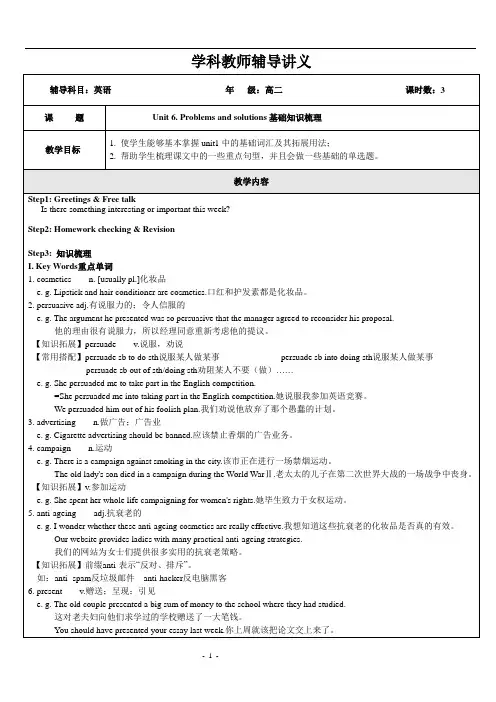
学科教师辅导讲义辅导科目:英语年级:高二课时数:3 课题Unit 6. Problems and solutions基础知识梳理教学目标1. 使学生能够基本掌握unit1中的基础词汇及其拓展用法;2. 帮助学生梳理课文中的一些重点句型,并且会做一些基础的单选题。
教学内容Step1: Greetings & Free talkIs there something interesting or important this week?Step2: Homework checking & RevisionStep3: 知识梳理I. Key Words重点单词1. cosmetics n. [usually pl.]化妆品e. g. Lipstick and hair conditioner are cosmetics.口红和护发素都是化妆品。
2. persuasive adj.有说服力的;令人信服的e. g. The argument he presented was so persuasive that the manager agreed to reconsider his proposal.他的理由很有说服力,所以经理同意重新考虑他的提议。
【知识拓展】persuade v.说服,劝说【常用搭配】persuade sb to do sth说服某人做某事persuade sb into doing sth说服某人做某事persuade sb out of sth/doing sth劝阻某人不要(做)……e. g. She persuaded me to take part in the English competition.=She persuaded me into taking part in the English competition.她说服我参加英语竞赛。
We persuaded him out of his foolish plan.我们劝说他放弃了那个愚蠢的计划。
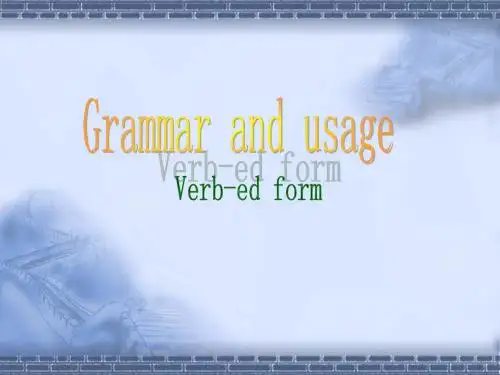
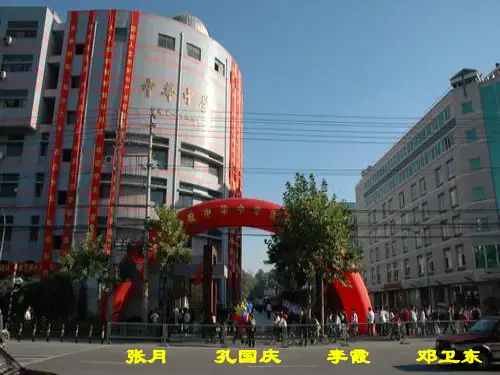
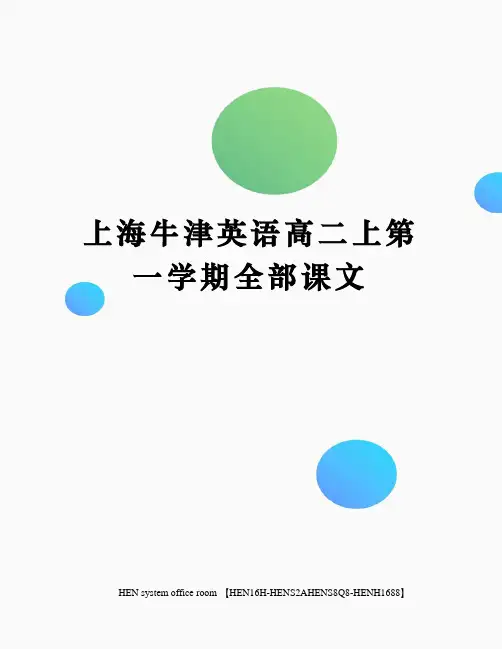
上海牛津英语高二上第一学期全部课文HEN system office room 【HEN16H-HENS2AHENS8Q8-HENH1688】S2A Chapter 1Reading My favorite sportSkiing is my favorite sport, even though I have only skied for four days in my whole life. Last year, my father promised to take me on a holiday if I did well in my exams. When I got straight A’s, Dad said’ ‘How about a weekend at the Botanical Gardens? ’However, my mu said, ‘No, you promised a special holiday. I think you ought to keep your word.’ And, despite the expense, he did,M y dream was to see some real snow, so in the Christmas vacation we flew to Seoul, South Korea, and then took a shuttle bus which runs back and forth between Seoul and Muju Resort. As the bus climbed through the mountains, we saw the snow in the trees. I was dying to get out of the bus.No one in my family had ever touched snow before. We were all like little children--- we picked it up, made snowballs, and threw them at each other!Then we checked in at the hotel. Our room overlooked one of the ski slopes. The slope was floodlit, so we watched people skiing until 10 . We could not wait to try it ourselves.The next day we had our first skiing lesson. We rented our ski suits, boots ad skis, and went outside onto the snow. Wearing skis for the first time makes you feel very strange. Suddenly you find you cannot even walk.Our instructor took us onto a gentle slope, and showed us some basic skills. In order to do up a hill, you have to stand sideways, and go up step by step. You must point the tips of your skis together so that you can stop. However, the tips must not cross, or you will fall. You should not ski alone in case you fall and get injured. To be honest, that first lesson was not a great success, and I kept falling down!However, the next day I definitely improved. I only fell over a few times, and I managed to do a few longer runs. I felt pleased with myself, and the instructor congratulated me, so I felt great. Although it was very cold, I spent most of that holiday skiing. It was the most wonderful time of my life. Nevertheless, it was all over too soon. Now I have decided to work part-time this summer, so I can earn enough money for another super skiing holiday.More reading Faster, Higher, StrongerThe Olympic Games have a long history. The first modern Games were held in Athens, Greece in 1896. Every four years,athletics from all over the world compete in various sports at the Games. The largest group participates in athletics.‘Athletics’ refers to sports in fou r areas: track, field,road and combined events. Track events, such as running and hurdling, test a person’s speed. In order to win a track event, a person needs to go faster than everyone else. Field events, however, test how high or far someone can jump in events suchas the long jump or high jump. They also test how far someonecan throw in events such as the shot-put, discus or javelin.The marathon and race walks are road events. They test endurance. In combined events, athletes are required to compete in a series of competition from each category. The most famous combined event is the decathlon. The decathlon involves ten different athletics events that take place over two days. Since the decathlon involves ten different athletics events that take place over two days. Since the decathlon tests all-around physical ability, the winner of the decathlon is often called‘the world‘s greatest athlete.’Although all Olympic sports are equal in importance, athletics is, in many ways, the best picture of the Olympic motto‘Faster, Higher, Stronger”. The desire of humanity to dobetter---to run faster, to soar higher and to push farther---is what the Olympics are all about.Chapter 2Reading Tutorial centresHelpfulI have been studying at a tutorial centre for two years. Thefees are very reasonable, and my command of English hasimproved greatly since I started.My tutors are all qualified teachers. They are sincere and kind.I have been helped a lot by them.One of my teachers was British. At first, I could not say anything to her. However, later I learnt how to communicate in English with a westerner.I think that the tutorial centre has given me a lot ofconfidence in using English.I go to sleepI have been attending a tutorial centre for two months. I have been forced to attend by my parents, but I do not think it is useful for me.I am always very tired after school. Sometimes I even sleep during the classes in the evening.Furthermore, the teachers are very boring. They give us a lotof supplementary exercises but they teach us nothing. I usually read comics during class. Sometimes I go to a video arcade instead. I think tutorial centres are uselessWaste of moneyI have studied at a tutorial centre for one year. However, I think that I have been cheated.These tutorial centres are only interested in making money, so they accept too many students for each class. However, they do not want to pay for good teachers. My English teacher was a university student who studied physics, not English!Very often, he could not answer our questions about the use of the language.In my opinion, it is better to spend more time on school work than to waste money at a ‘money-making’ tutorial centre.Good and badI have experienced both good and bad tutorial centres.In my first centre, I was in a very big class. My teacher wasan Australian. He just talked about his travels. I could learn nothing from him. I left within a month.Then I ask all my friends for their advice. As a result oftheir recommendations, I enrolled on a course at another centre. The teachers are excellent here and the classes are small. We have been taught many good techniques for developing our language and studying skills.There are both good and bad tutorial centres, so you must do some detective work before you enroll.However, the most important thing is whether you are willing to learn and to work hard. The key factor is yourself. ?More reading Independent learningIndependent learning is one solution for those who want to continue their education, nut have no time for it. It is often described as ‘a class of one’, because you work alone. You study at your own pace, at a time and place convenient for you. These courses can help you get a degree, help your career, or help you learn what interests you.One type of independent learning is the correspondence course, In a correspondence course, a school sends you textbooks, study guides, and materials such as video and audio discs. You communicate with your teacher by mail. Your teacher reads your papers and makes comments, Your marks are recorded by the school before they are mailed back to you.A newer style of independent learning is e-learning. With e-learning, you study using computer software or the Internet. You can learn on your own, or you can enroll on a course. Usually, in an e-learning course, students communicate with their teachers through e-mail. However, some students have been using video recently. This allows the teacher and the students to see and communicate with each other at the same time.Independent learning gives you the freedom to adapt yourlearning to your lifestyle. However, it requires self-discipline and hard work, so not everyone is successful at it. Those who are successful receive a real sense of achievementand satisfaction.Chapter 3Reading FashionMy topic is ‘Fashion’. Fashion is important to almost all of us. By fashion, we usually mean popular trends in styles of dress. When we do out or to a party, we usually like to wear fashionable clothes. To illustrate my talk, I have broughtalong five objects.My first object is this blouse. It looks beautiful, doesn’t it? It’s my most expensive piece of clothing, and I love it. Itcost me $200. It may seem very extravagant, but I could affordit with my own savings. It wasn’t ea sy for me to earn the money, but when buying clothes, I think the more you spend the better the quality. So you see, fashion is quite important to me.However, I’m not as keen on fashion as my brother Gary. Last summer, he won a free trip to London in a contest. Theorganizers wanted to show him some famous sights. But hedidn’t appreciate old buildings. He just spent all his timesearching for the coolest pair of trainers! For him, fashionwas more important than culture. These are the trainers he bought. Was it worth a trip to London to buy these? Well, I don’t think so. It was a waste of time and money.Fashion is very big business. Changes in fashion can create or ruin jobs. As an example, I have brought this blonde wig toshow you. It belongs to one of my mum’s friends. In the 1960s, these were very fashionable. But a few years later fashions changed, and women wore wigs much less often. Many wigfactories closed down, and hundreds of workers lost their jobs, which was terrible!Fashion can affect the na tural world, as well. I’m holding an old hat borrowed from a drama company. It’s made of beaver fur. These hats were very fashionable about 200 years ago. As a result, beavers almost became extinct. Luckily, in the 1850s, these hats went out of style and the beavers were saved.Finally, we should remember the saying,’ never judge a book by its cover.’ Clothes will not make us more or less clever,better or worse, more or less honest. I once saw a movie about Mother Teresa. She spent all her life helping poor people in India, most of whom were dying. In 1979, she was awarded the Nobel Prize for Peace. When she flew to get the award, she wore the same old clothes as usual, and carried all her possessionsin a little bag like this, which I bought in a market. This reminds us that fashion is not the most important thing in life. Thank you.More reading Uniform fashion good for young students School uniforms are not part of the traditional way of life in the USA. In 1987, Cherry Hill Elementary, which is in the Maryland, went against tradition by becoming the first public school in the USA to make students wear uniforms. The schooldid this to reduce trouble caused by the students’ love of fashion. Since this new programme has proved to be a good wayto promote safety and discipline, other schools soon followed. By 2000, 12 pert cent of American public schools requiredschool uniforms.The introduction of school uniforms has helped reduce school violence. Much of school violence is linked to the wearing of gang colours, which are the clothes worn by different youth gangs. In schools with youth gangs, the number of fights decreased by 40 per cent after uniforms wre introduced.Uniforms also send a message that students are at school to study, not to play. They reduce peer pressure and create school pride. These things help raise the academic level of the students.Although school uniforms are popular in some areas, this newtren has met strong resistance from many parents, some of whom angrily complain that uniforms keep students from showing their individuality. A few parents have even gone too curt to stop school uniforms from being introduced. For this reason, it is unlikely that uniforms will ever be adopted nationwade.Chapter 4Reading The hamburger businessIn 1954, an American businessman called Ray Kroc was selling milkshake machines. One small drive-in hamburger stand in California bought not one but eight of these expensive machines. Surprised by this Kroc decided to go and visit it.Arriving before the hamburger stand opened, Kroc sat in his car and watched. A team of young people in uniforms appeared and started cleaning the stand and its car park, making everything neat and tidy. When opened for business, the hamburger standwas immediately filled with customers. The staff were cheerful, fast and polite. The food was excellent. Impressed by the cleanliness, service and food, Kroc looked up at the name over the hamburger stand. It read, ‘McDonald’s Hamburgers’. Although started six years earlier, in 1948, McDonald’s wasstill a small business owned by two brothers, Mac and Dick McDonald. Kroc suggested that they should set up more outlets,but the brothers were happy with their life and did not want to expand further. However, they did allow Kroc to launch other branches of McDonald’s for them. That was the start of the biggest fat-food company in history.In 1955, Kroc opened his first McDonald’s near Chicago, and many more swiftly followed. In 1959, the 100th McDonald’s was opened. In 1961, Kroc took over complete ownership of the business from the brothers by paying them US $ million.By 1972, a new McDonald’s was being opened every day, and by 1974 there were over 3,000 restaurants. McDonald’s came to Hong Kong in 1975, and was introduced into Shenzhen in1990. Two years later, the first McDonald’s in Beijing opened with more than 40,000 customers on its first day.Why has McDonald’s been so successful? Back in 1956, McDonald’s adopted the motto ‘Q. S. C. &V.’ These letters stand for’ Quality, Service, Cleanliness and Value’. In all of these areas, McDonald’s pay great attention to detail.For example, after years of planning, McDonald’s established its largest ever restaurant in Moscow in1990. To achieve the right quality, potatoes are imported into Russia, and farmers are taught how to farm them properly, as well as how to harvest and pack them.To achieve good service, McDonald’s has one of the best training programmes in the world. It even has seven Hamburger Universities (one in Hong Kong) where top personnel can learn management and customer service skills.By 2005, McDonald’s had over 30,000 outlets in 119 countries and regions. It sells more than 100 hamburgers every second of the day. While it does not yet have a restaurant on the Moon, no doubt a plan is already being made for one.More reading The rise of chain stores in ChinaDuring the last few years, the number of chain stores has greatly increased in big cities in China. Nowadays, within a short walk along a busy street, you are likely to find a chain store of some kind---a fast food restaurant, a bakery or a convenience store.Chain stores have become part of people’s daily lives. They may pop into a BreadTalk to buy a sweet roll for breakfast on their way to work. They may visit a Lianhua Supermarket in the evening to buy some food for dinner,\For a birthday, they might celebrate with friends at a Little Sheep Hotpot Restaurant. At the weekend they may go to GoMe Appliances to buy a DVD or MP3 player. Chain stores have become so popular that some people include them as a factor when deciding where to live.Why have chain stores grown so fast in number and influence? Meeting the customers’ needs is the answer. Opened inconvenient locations, the stores are usually next door to people’s homes and cl ose to bus stops or underground stations. They offer a wide range of products in a clean, well-lit and relaxing environment. Every store in a chain operates in the same way as the others do. That way, everyone knows what to expect in case they shop there. The prices are reasonable too.It seems that chain stores are a welcome development in China. They are certainly a new force changing people’s way of life. Chapter 5Reading Virtual realityOnly 50 years ago, computers were bigger than people. Today, people can carry their laptops with them anywhere they go. Soon, we may be able to step inside a computer world thanks to the magic of virtual reality.What is virtual reality, or VR? If something is virtual, thenit is created by computer technology and appears as if it were real. Virtual reality is a computer system with a special headset. When you put on the headset, you look at two tiny television screens. They are so close to your eyes that your mind will see the image as one picture, and you will believethat you have entered a different world. In many systems, youalso wear a special data glove. With this glove you can reach out and touch things in the artificial world.The first VR games, already sold round the world, enable you to drive a sports car, fly a plane, or fight an enemy. In the future, it may be difficult to distinguish the virtual world of the games from the real world outside.However, VR is not just for entertainment. One day, delighted children will be able to learn geography by observing exciting foreign countries without having to leave their classroom. They will be thrilled to learn history by visiting the pyramids of Egypt, or by hand-feeding friendly dinosaurs.In addition, business will be able to use VR for many tasks. Cars designed using computers can be tested as virtual machines first, before they are manufactures in metal. Architects will be able to make virtual buildings, which they can walk around and inspect before constructing. VR can help us in hundreds of ways.Despite this, concerned critics have warned that there could be dangers in this powerful new medium. Will we have VR games in which people can commit virtual crimes? After people get used to VR, will they want to return to reality? Will we forget how to live and work with real people?On the other hand, some people think that VR will help us improve the world. By experimenting harmlessly inside a VR world, we will be able to see the dangers we may face in the future. Then we will be able to avoid them in real life.No doubt there will be some problems with VR, as there are with all new inventions. However, one thing is for sure: VR is here to stay. Get ready to step into another world!More reading Wearable technology????????????Did you know that some technology can be worn?In fact, wearable technology has been around for some time. The first people to experiment with the idea were managers of sports teams. They wanted to know how athletes could use technology to improve their performance. Special vests, created to monitor an athlete’s body, can measure how fast the heart is beating and how hard the athlete is breathing. Scientists have also developed ‘cooling’ vests to help athletes perform better in difficult conditions, such as hot weather. Furthermore, an American company is currently researching clothes for soldiers to help them run faster, jump higher and lift heavier equipment.Before long, we will have technology in our everyday clothing.A computer hidden in a coat could be operated by a keyboard on one of the sleeves.Electronic sunglasses could show us maps of where we are standing and point us in the direction that we want to go. Our clothes could also monitor our bodies. They could tell us when we need to eat certain foods, take medicine or rest in order to stay healthy.There is only one problem with clothes like these: They may be difficult to wash. Electricity and water do not mix! You could remove the electronic parts before washing, but putting them back in again could take hours. Designers are now building small wires into the fabric of the clothing to solve this problem.These clothes could appear in shops any day now. Soon, we could all be wearing electronic clothes.Chapter 6Reading Transforming MarsEver since the beginning of history, people have dreamt of interplanetary travel. For centuries, these dreams have always remained dreams. However, scientists now want to make these dreams come true. They are planning to transform Mars so that humans can live there. Within 30 years, the first people will land on Mars and, by the year 2185, we will have established cities.In many ways, Mars is the planet most similar to Earth. AMartian day lasts about 24 1/2 hours (although a year has 687 days). While there is no water, there is a lot of ice in thetwo polar ice caps. The average temperature is -60℃.The plan involves changing Mars so that it becomes more like Earth. This means using the ‘greenhouse effect’ (which we are trying to stop on Earth). The suggested programme would havefive main stages.Stage 1 (AD 2030-2045).The first expedition arrives on Mars, after a journey by spacecraft of about six months. The members construct underground buildings, conduct experiments, look for good sites for future landings, and also check for signs of life. They can survive only as long as they wear spacesuits, because 95 percent of the atmosphere is carbon dioxide. Nonetheless, the low gravity (one-third of Earth’s) means they can move around easily.Stage 2 (AD 2045-2095)More expeditions arrive. Huge mirrors are put in orbit round Mars to heat the polar ice caps. The ice caps are sprayed black, so that they do not reflect the heat away. Chemicals arereleased into the air. As a result, the atmosphere becomesthicker and retains more of the Sun’s heat. If the greenhouseeffect can be started, the ice caps will melt, releasing water vapour, and the temperature will rise to -40℃.Stage 3 (AD 2095-2130)Next, plants are introduced from Earth. If these plants can survive on Mars, carbon dioxide can be converted into oxygen. The first clouds appear, and the sky slowly turns from pink to blue. The temperature goes to -15℃.Stage 4 (AD 2130-2145)The warming continues, melting more ice. Rivers and smalloceans are made. More people migrate from Earth and construct towns. Forests of trees are planted. Mars is looking greener. The temperature is 0℃.Stage 5 (AD 2145-2185)Mars is getting more like Earth. The amount of oxygen in theair rises, and the air becomes breathable. The inhabitants cango outside without spacesuits. The temperature reaches10℃.(Since Mars is 228 million kilometers from the Sun, it can never be as warm as Earth) Cities, farms and industries arebuilt all over Mars. The transformation is complete.More reading Chinese manned space flightsChinese people have always dreamt of flying to space. Around AD 1500, a man named Wan Hu made the first attempt at space flight. He sat down in his chair, tried 47 rockets to it, and then litthem. There was a big boom. When the smoke cleared, Wan Hu was gone. The people watching might have thought that he was successful. However, we know now that his rockets were not powerful enough to send him into space. He most likely was consumed in the explosion.Jumping ahead nearly 500 years, in 1992 China began its manned space programme, leading to the space flight of Yang Liwei, China’s first astronaut, in Shenzhou 5 on 15 Oc tober 2003. China became the third country, after the USA and Russia, to send a man into space. Yang Liwei spent only about 21hours in space. This time was beaten by China’s next manned space flight, Shenzhou 6, which began on 12 October this flight, Chinese astronauts Fei Junlong and Nie Haisheng spent five days orbiting Earth.In the future, China plans to have its own manned space station orbiting Earth. China is also developing a programme, named Chang’e after the story of a beautiful young girl who fl oated to the Moon, of missions leading to a lunar station. Chinese scientists are already researching on the idea of sending women into space. If China sends a woman to the Moon, the story of Chang’e will no longer be so difficult to believe。
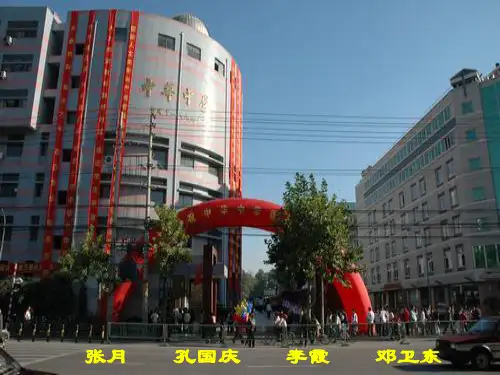
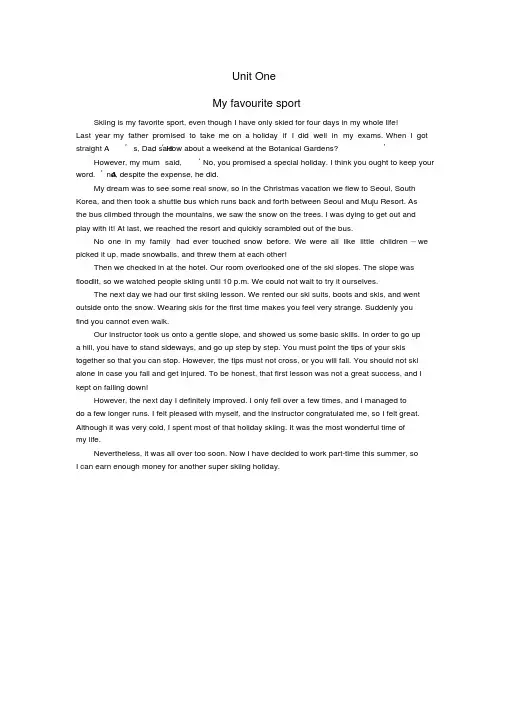
My favourite sportSkiing is my favorite sport, even though I have only skied for four days in my whole life!Last year my father promised to take me on a holiday if I did well in my exams. When I got , ‘How about a weekend at the Botanical Gardens?’straight A’s, Dad saidHowever, my mum said, ‘No, you promised a special holiday. I think you ought to keep your nd, despite the expense, he did.word.’ AMy dream was to see some real snow, so in the Christmas vacation we flew to Seoul, South Korea, and then took a shuttle bus which runs back and forth between Seoul and Muju Resort. Asthe bus climbed through the mountains, we saw the snow on the trees. I was dying to get out andplay with it! At last, we reached the resort and quickly scrambled out of the bus.No one in my family had ever touched snow before. We were all like little children-we picked it up, made snowballs, and threw them at each other!Then we checked in at the hotel. Our room overlooked one of the ski slopes. The slope was floodlit, so we watched people skiing until 10 p.m. We could not wait to try it ourselves.The next day we had our first skiing lesson. We rented our ski suits, boots and skis, and went outside onto the snow. Wearing skis for the first time makes you feel very strange. Suddenly youfind you cannot even walk.Our instructor took us onto a gentle slope, and showed us some basic skills. In order to go upa hill, you have to stand sideways, and go up step by step. You must point the tips of your skis together so that you can stop. However, the tips must not cross, or you will fall. You should not ski alone in case you fall and get injured. To be honest, that first lesson was not a great success, and I kept on falling down!However, the next day I definitely improved. I only fell over a few times, and I managed todo a few longer runs. I felt pleased with myself, and the instructor congratulated me, so I felt great. Although it was very cold, I spent most of that holiday skiing. It was the most wonderful time ofmy life.Nevertheless, it was all over too soon. Now I have decided to work part-time this summer, soI can earn enough money for another super skiing holiday.Tutorial centers1 HelpfulI have been studying at a tutorial centre for two years. The fees are very reasonable, and my command of English has improved greatly since I started.My tutors are all qualified teachers. They are sincere and kind. I have been helped a lot by them.One of my teachers was British. At first, I could not say anything to her. However, later I learnt how to communicate in English with a westerner.I think that the tutorial centre has given me a lot of confidence in using English.MANDY ZHANG2 Waste of moneyI have studied at a tutorial centre for one year. However, I think that I have been cheated. These tutorial centres are only interested in making money, so they accept too many students for each class. However, they do not want to pay for good teachers. My English teacher was a university student who studied physics, not English! Very often, he could not answer our questions about the use of the language.In my opinion, it is better to spend more time on school work than to waste money at a ‘money-making’ tutorial centre.REX YANG3 I go to sleepI have attending a tutorial centre for two months. I have been forced to attend by my parents, but I do not think it is useful for me.I am always very tired after school. Sometimes I even sleep during the classes in the evening.Furthermore, the teachers are very boring. They give us a lot of supplementary exercises but they teach us nothing. I usually read comics during class. Sometimes I go to a video arcade instead.I think tutorial centres are useless.SIMON LAN4 Good and badI have experienced both good and bad tutorial centres.In my first centre, I was in a very big class. My teacher was an Australian. He just talked about his travels. I could learn nothing from him. I left within a month. Then I asked all my friends for their advice. As a result of their recommendations, I enrolled on a course at another centre.The teachers are excellent here and the classes are small. We have been taught many good techniques for developing our language and study skills.There are both good and bad tutorial centres, so you must do some detective work before you enroll.However, the most important thing is whether you are willing to learn and to work hard. Thekey factor is yourself.GRACE LIFashionMy topic is ‘Fashion’. Fashion is important to almost all of us. By fashion, we usually meanpopular trends in styles of dress. When we go out or to a party, we usually like to wear fashionableclothes. To illustrate my talk, I have brought along five objects.My first object is this blouse. It looks beautiful, doesn’t it? It’smy most expensive piece ofclothing, and I love it. It cost me $200. It may seem very extravagant, but I could afford it with myown savings. It wasn’t easy for me to earn the money, but when buying clothes, I think the moreyou spend the better the quality. So you see, fashion is quite important to me.However, I’m not as keen on fashion as my brother Gary. Last summer, he won a free trip toLondon in a contest. The organizers wanted to show him some famous sights. But he didn’tappreciate old buildings. He just spent all his time searching for the coolest pair of trainers! Forhim, fashion was more important than culture. These are the trainers he bought. Was it worth a tripto London to buy these? Well, I don’t think so. It was a waste of time and money.Fashion is very big business. Changes in fashion can create or ruin jobs. As an example, I havebrought this blonde wig to show you. It belongs to one of my mum’s friends. In the 1960s, these were very fashionable. But a few years later fashions changed, and women wore wigs much lessoften. Many wig factories closed down, and hundreds of workers lost their jobs, which wasterrible!Fashion can affect the natural world, as well. I’m holding an old hat borrowed from a dramacompany. It’smade of beaver fur. These hats were very fashionable about 200 years ago. As aresult, beavers almost became extinct. Luckily, in the 1850s, these hats went out of style and thebeavers were saved.Finally, we should remember the saying, ‘never judge a book by its cover.’ Clothes will not makeus more or less clever, better or worse, more or less honest. I once saw a movie about MotherTeresa. She spent all her life helping poor people in India, most of whom were dying. In 1979, shewas awarded the Nobel Prize for Peace. When she flew to get the award, she wore the same oldclothes as usual, and carried all her possessions in a little bag like this, which I bought in a market.This reminds us that fashion is not the most important thing in life.Thank you.。
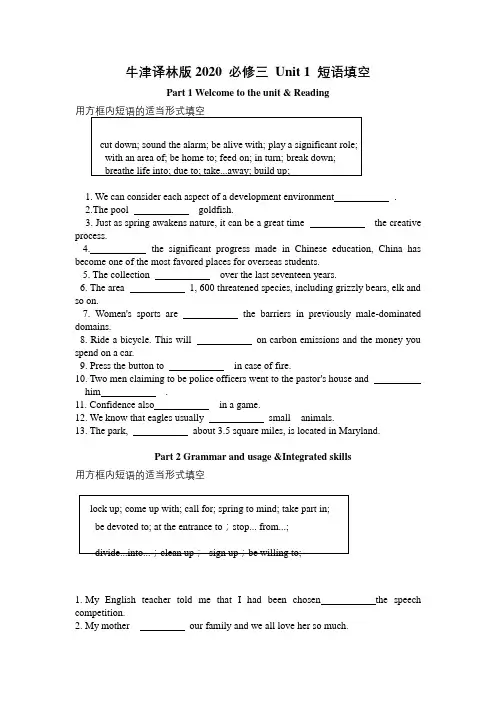
牛津译林版2020 必修三Unit 1 短语填空Part 1 Welcome to the unit & Reading用方框内短语的适当形式填空cut down; sound the alarm; be alive with; play a significant role;with an area of; be home to; feed on; in turn; break down;breathe life into; due to; take...away; build up;1. We can consider each aspect of a development environment .2.The pool goldfish.3. Just as spring awakens nature, it can be a great time the creative process.4. the significant progress made in Chinese education, China has become one of the most favored places for overseas students.5. The collection over the last seventeen years.6. The area 1, 600 threatened species, including grizzly bears, elk and so on.7. Women's sports are the barriers in previously male-dominated domains.8. Ride a bicycle. This will on carbon emissions and the money you spend on a car.9. Press the button to in case of fire.10. Two men claiming to be police officers went to the pastor's house andhim .11. Confidence also in a game.12. We know that eagles usually small animals.13. The park, about 3.5 square miles, is located in Maryland.Part 2 Grammar and usage &Integrated skills用方框内短语的适当形式填空lock up; come up with; call for; spring to mind; take part in;be devoted to; at the entrance to;stop... from...;divide...into...;clean up;sign up;be willing to;1.My English teacher told me that I had been chosen the speech competition.2. My mother our family and we all love her so much.3.He was so convinced that Los Angeles was west of Reno that hebet me two dollars.4.We have been asked some new ideas.5. Visitors should stand the cubicle and make their presence known first.6.Jack wanted for the school basketball team, hoping that one day he could become a professional basketball player.7.Remember your bicycle when you leave it near the subway station.8. This event everyone to stand up and take on responsibility towards sustainable (可持续性的) future.9. In November, experts tested a drug on people in the US and France. The drugthe body releasing chemicals that fix memories in the brain.10. If the government really wants the UK's air, it has a lot more work to do.11. Most people culture two forms:“high ” culture and “low” culture.12. If any other questions ,don' t hesitate to contact me.Part 3 Extended reading, Project, Assessment& Further study用方框内短语的适当形式填空1.A new witness will be called by the lawyer to speak his client.2. After a struggle I the black clouds, and was able to observe with my ordinary senses again.3. Interest rates were cut and, ,share prices (股价) rose.4. Uncertainties affecting peace and development are .5. Her parents, who don't have much to do, suddenly her job and asked many questions.6.A pedestrian bridge now the parking garage the mall.7.Everyone in the class seemed to learn.8. The new couple are often seen to walk with each other in the street.9. Poor men the law. They said it was unfair.10. Do you think that work without rest will your health?11. Her father told her not to those students who always break school rules.12. Low levels of choline (胆碱) in the body can high blood pressure.。
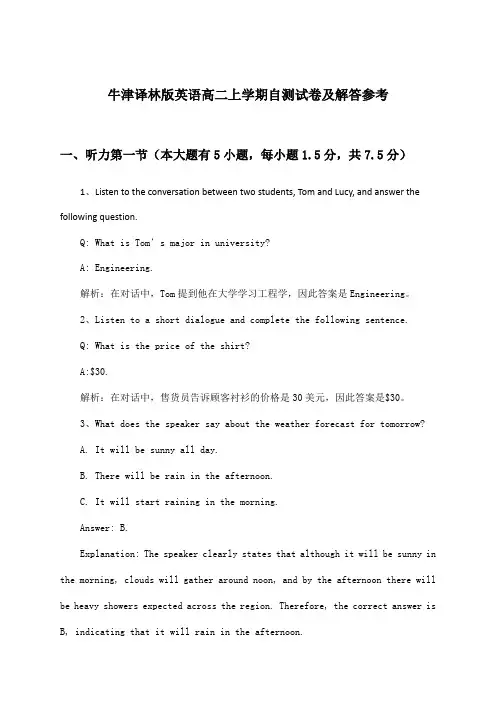
牛津译林版英语高二上学期自测试卷及解答参考一、听力第一节(本大题有5小题,每小题1.5分,共7.5分)1、Listen to the conversation between two students, Tom and Lucy, and answer the following question.Q: What is Tom’s major in university?A: Engineering.解析:在对话中,Tom提到他在大学学习工程学,因此答案是Engineering。
2、Listen to a short dialogue and complete the following sentence.Q: What is the price of the shirt?A:$30.解析:在对话中,售货员告诉顾客衬衫的价格是30美元,因此答案是$30。
3、What does the speaker say about the weather forecast for tomorrow?A. It will be sunny all day.B. There will be rain in the afternoon.C. It will start raining in the morning.Answer: B.Explanation: The speaker clearly states that although it will be sunny in the morning, clouds will gather around noon, and by the afternoon there will be heavy showers expected across the region. Therefore, the correct answer is B, indicating that it will rain in the afternoon.4、According to the dialogue, what time will the meeting start?A. At 9:00 AM.B. At 10:00 AM.C. At 11:00 AM.Answer: A.Explanation: In the conversation, one participant confirms the meeting schedule saying, “Just to confirm, our meeting is still set for 9 o’clock sharp, right?” To which the other replies affirmatively. Hence, the correct answer is A, the meeting will start at 9:00 AM.5.You will hear a conversation between two students discussing their summer vacation plans. Listen carefully and answer the following question.Question: How many weeks will the student who is going to the beach spend on the trip?A. 2 weeksB. 3 weeksC. 4 weeksD. 5 weeksAnswer: B. 3 weeksExplanation: In the conversation, the student mentions that they are going to the beach for their summer vacation and plans to spend 3 weeks there. The other student responds by saying, “That sounds great! I hope you have a wonderful tim e.” Therefore, the correct answer is 3 weeks.二、听力第二节(本大题有15小题,每小题1.5分,共22.5分)1、What time does the man decide to take the train to London?A. 3:15 PMB. 4:00 PMC. 3:45 PMAnswer: A. 3:15 PMExplanation: The man in the conversation asks about the next train to London, and after being given two options, he chooses the 3:15 PM train.2、What kind of discount is the woman offered for her flight to Paris?A. 10% offB. 20% offC. 30% offAnswer: B. 20% offExplanation: The travel agent informs the woman that she can receive a 20% discount on her flight to Paris if she books before Friday.3、Listen to the conversation between two students in the library and answer the question.Student A: Hey, have you checked out the new English novels in the library yet?Student B: Yes, I did. I found a couple of interesting ones. Did you get anything?Student A: Not yet. I’m still looking. I wanted to find something that wouldhelp me improve my vocabulary.Question: What is one reason Student A is looking for a book in the library?A) To borrow a novel for leisure reading.B) To find a book to help improve vocabulary.C) To check out a book for a class assignment.D) To borrow a book for a friend.Answer: B) To find a book to help improve vocabulary.Explanation: Student A mentions looking for a book that will help improve their vocabulary, indicating that the primary reason for their search is educational rather than for leisure or other reasons.4、Listen to the following dialogue between a teacher and a student in the school office and answer the question.Teacher: Good morning, Sarah. Is there something I can help you with?Student: Yes, Mr. Smith. I need to change my elective class for the second semester.Teacher: Sure, I can help you with that. What course are you interested in switching to?Student: I was thinking of taking the Advanced Physics class. I heard it’s quite challenging but also very interesting.Question: What is Sarah’s reason for wanting to switch elective classes?A) The Advanced Physics class is too easy.B) The Advanced Physics class is too challenging.C) She wants to take a class with fewer students.D) She heard the class is not very interesting.Answer: B) She wants to take a class that is quite challenging but also interesting.Explanation: Sarah expresses her interest in the Advanced Physics class because she heard it is challenging but also interesting, which suggests that the difficulty level and potential enjoyment of the class are her reasons for wanting to switch.5、What does the man suggest the woman do?A. Go to the movies.B. Study for her exams.C. Go out for dinner.D. Attend a concert.Answer: B.Explanation: In the conversation, the man asks the woman if she wants to go to a movie, but she declines because she has exams coming up and needs to study. Therefore, the correct answer is B, as he implicitly suggests that she should study by acknowledging her exams.6、Where did the woman find her keys?A. In her purse.B. On the kitchen table.C. Under the sofa cushion.D. In the car.Answer: C.Explanation: The dialogue indicates that the woman had been looking for her keys everywhere. When the man asks if she checked under the sofa cushion, she exclaims that she found them there. Thus, the correct answer is C, as it directly states where the keys were found.7.You will hear a conversation between two students discussing their summer plans. Listen to the conversation and answer the following question.Question: What does the girl want to do during her summer vacation?A. Travel to Europe.B. Spend time with her family.C. Work as a volunteer.D. Take a part-time job.Answer: BExplanation: In the conversation, the girl mentions that she would like to spend her summer vacation with her family, which is why the correct answer isB. The other options are not mentioned by the girl in the conversation.8.You will hear a short talk about the importance of environmental protection. Listen to the talk and answer the following question.Question: According to the speaker, what is the main reason for the current environmental problems?A. Overpopulation.B. Industrial pollution.C. Deforestation.D. Climate change.Answer: DExplanation: The speaker in the talk emphasizes that climate change is the primary cause of the environmental problems we are facing today. While overpopulation, industrial pollution, and deforestation are also contributing factors, the speaker identifies climate change as the main reason. Therefore, the correct answer is D.9、Questions 9 to 11 are based on the passage you have just heard.9、What is the main topic of the lecture?A. The impact of global warming on polar bear populations.B. The effects of deforestation on local communities.C. The role of renewable energy in reducing carbon footprints.D. The benefits of recycling and waste reduction.Answer: C.Explanation: The speaker emphasizes the importance of shifting to renewable energy sources throughout the lecture, highlighting how it can significantly reduce our carbon footprints and combat climate change. While other topics such as recycling and waste reduction were mentioned, they were not the central theme.10、According to the passage, what is a significant benefit of using solar panels?A. They generate no noise pollution.B. They can be installed anywhere.C. They require minimal maintenance.D. They reduce reliance on fossil fuels.Answer: D.Explanation: The passage states that one of the key benefits of solar panels is that they help decrease dependency on fossil fuels, which is a major contributor to greenhouse gas emissions. Although solar panels do offer other advantages such as being quiet and relatively low-maintenance, the focus was on their role in promoting sustainability by reducing fossil fuel use.11.You will hear a short conversation between two students in a library. Listen carefully and answer the following question.Q: What are the two students mainly discussing?A: The due date for the library books they borrowed.Answer: The due date for the library books they borrowed.Explanation: In the conversation, the first student asks the second student about the return date of the library books, indicating that they are discussing the due date for the books they borrowed.12.You will hear a dialogue between a teacher and a student about an assignment. Listen carefully and answer the following question.Q: What is the assignment that the student is going to submit?A: A research paper on the history of the Renaissance.Answer: A research paper on the history of the Renaissance.Explanation: In the dialogue, the student mentions that they are working on a research paper about the Renaissance, which is the assignment they are going to submit. The teacher also confirms this by asking the student to explain more about the topic.13、What was the main reason for the revival of the Olympic Games in the late 19th century?A. To promote international understanding through sport and to build a more peaceful world.B. To provide athletes with an opportunity to compete at a professional level.C. To honor the Greek gods and celebrate human achievement.D. To increase tourism and economic growth in host countries.Answer: A.Explanation: The passage mentioned that the modern Olympics were revived in 1896 by Pierre de Coubertin with the aim of promoting peace and understanding among nations through sports.14、Which of the following statements about the ancient Olympic Games is NOT true according to the passage?A. They were held every four years in Olympia.B. Only male athletes could participate in the games.C. Women had their own separate games called the Heraean Games.D. The games included a wide variety of sports like football and basketball.Answer: D.Explanation: The passage clearly stated that the ancient Olympic Games did not include modern sports such as football or basketball, which were developed much later. Instead, they featured events like running, long jump, discus throw, boxing, wrestling, and chariot racing.15.Listen to the conversation and answer the question.A. What is the man doing?B. Why does the woman apologize?C. Where does the conversation take place?D. What time does the train leave?Answer: A. What is the man doing?Answer: The man is waiting for his train to leave.Explanation: In the conversation, the woman asks the man if he is waiting for the train. The man confirms that he is, so the correct answer is A. What is the man doing? The other options are not mentioned in the conversation.三、阅读第一节(第1题7.5分,其余每题10分,总37.5分)第一题Read the following passage carefully and then answer the questions that follow.The Internet has become an integral part of our daily lives, providing uswith a vast amount of information, entertainment, and communication tools. However, with the convenience and ease of access come a variety of challenges, including privacy concerns, cybersecurity threats, and information overload. This essay explores the impact of the Internet on society and the measures that can be taken to mitigate its negative effects.1、The Internet has revolutionized the way we communicate. It allows people from all over the world to connect instantly, breaking down geographical barriers and fostering global communities. This has led to a more interconnected world, where information and ideas can flow freely.2、On the other hand, the Internet has raised concerns about privacy. Personal information is easily accessible to hackers and cybercriminals, leading to identity theft and other forms of cybercrime. This has prompted governments and companies to implement stricter data protection measures.3、Another significant challenge posed by the Internet is information overload. With an overwhelming amount of information available, it can be difficult to discern what is accurate and reliable. This can lead to misinformation and confusion, particularly in areas such as politics and healthcare.4、To address these challenges, several measures can be taken. Governments and companies should continue to inv est in cybersecurity to protect users’ personal information. Additionally, educational initiatives can help people develop critical thinking skills to evaluate the credibility of online content.Questions:1、What are the positive aspects of the Internet in terms of communication?2、What are the concerns regarding privacy on the Internet?3、How does the Internet contribute to information overload?4、What measures can be taken to mitigate the negative effects of the Internet?Answers:1、The positive aspects of the Internet in terms of communication include breaking down geographical barriers and fostering global communities.2、The concerns regarding privacy on the Internet include the ease of access to personal information by hackers and cybercriminals.3、The Internet contributes to information overload by providing an overwhelming amount of information, making it difficult to discern what is accurate and reliable.4、Measures that can be taken to mitigate the negative effects of the Internet include investing in cybersecurity and implementing educational initiatives to develop critical thinking skills.Question 2:Who is Mr. Thompson in the passage?A. Eliza’s ancest or.B. A local historian.C. The Normans who planted the oak tree.D. The owner of the Lymington Oak.Answer: BQuestion 3:What is the significance of the locket that Eliza discovers?A. It is a symbol of strength and resilience.B. It contains a photograph and a letter about the family’s history.C. It is a beautifully crafted artifact.D. It is hidden beneath the Lymington Oak.Answer: BQuestion 4:What does the letter inside the locket reveal about the family?A. The family’s l ove for the Lymington Oak.B. The family’s connection to the Normans.C. The family’s history and the significance of the locket.D. The family’s struggle during the Battle of Hastings.Answer: C第三题Section ARead the following passage carefully and then answer the questions below.In the small town of Willow Creek, there was once a charming old library. It stood at the center of the town square, surrounded by trees and flowers. The library was more than just a place to read books; it was a hub of communityactivity. People of all ages would gather there to read, discuss, and share stories.The librarian, Mrs. Thompson, was a beloved figure in the town. She had been working there for over 30 years and knew everyone by name. She was passionate about books and made sure that the library always had a wide variety of books for her patrons. Mrs. Thompson also organized many events, such as book clubs, storytelling sessions, and art exhibitions.One day, the town council decided to renovate the library. They wanted to update the building and make it more accessible to the community. However, many townspeople were worried about the changes. They feared that the library would lose its charm and become just another modern building.Despite the concerns, the renovation went ahead. The library was expanded, and new technology was added. However, Mrs. Thompson remained at the heart of the library. She continued to organize events and help people find the books they loved.1、What was the library in Willow Creek known for?A. It was a place for reading books only.B. It was a hub of community activity.C. It was the town council’s office.D. It was a place for art exhibitions.2、How long had Mrs. Thompson been working at the library?A. 10 yearsB. 20 yearsC. 30 yearsD. 40 years3、What did Mrs. Thompson do to make the library a welcoming place?A. She limited the number of books available.B. She removed the art exhibitions.C. She organized events and events for the community.D. She ignored the town council’s decisio ns.4、What did the townspeople worry about during the renovation?A. The library would become just another modern building.B. The library would lose its charm.C. Mrs. Thompson would leave the library.D. The library would close down.Fourth Question: Reading ComprehensionPassage:The following is an excerpt from a travel article about the city of Kyoto, Japan.Kyoto, often referred to as the “City of Ten Thousand Shrines,” is a city steeped in history and culture. It is located in the Kansai region of Japan, and its history dates back to the 8th century. The city is known for its beautiful gardens, traditional temples, and historical palaces. One of the most famous shrines in Kyoto is Fushimi Inari Shrine, famous for its thousands of vermiliontorii gates.Kyoto was the capital of Japan from 794 to 1185 and is home to many important cultural and historical sites. The city’s historic sites have been designated as a UNESCO World Heritage Site. One such site is the Kinkaku-ji (the Golden Pavilion), which is a Zen Buddhist temple covered in gold leaf. Another notable site is the Kyoto Imperial Palace, which was the residence of the Imperial family until the Meiji Restoration in 1868.Kyoto is also famous for its traditional tea ceremonies, which are an integral part of Japanese culture. The city has a thriving culinary scene, offering a wide variety of traditional and modern Japanese cuisine. In addition, Kyoto is known for its traditional craft industries, such as kiyomizu-yaki (Kyoto-style ceramics) and kumihimo (Japanese braiding).The city’s beauty is further enhanced by its four distinct seasons. Spring brings cherry blossoms, summer offers lush greenery, autumn showcases vibrant foliage, and winter is characterized by snowy landscapes.Questions:1、What is the main reason Kyoto is known as the “City of Ten Thousand Shrines”?A. It has the largest number of temples in Japan.B. It is home to a famous shrine with thousands of vermilion torii gates.C. It has a long history of religious significance.D. It has more than ten thousand temples.2、Which of the following sites is NOT mentioned in the passage as a UNESCO World Heritage Site?A. Fushimi Inari ShrineB. Kinkaku-ji (the Golden Pavilion)C. Kyoto Imperial PalaceD. Tokyo Tower3、What is the significance of the Golden Pavilion (Kinkaku-ji) in Kyoto?A. It is a modern architectural marvel.B. It is a Zen Buddhist temple covered in gold leaf.C. It is the largest Buddhist temple in Japan.D. It is a historical site related to the Meiji Restoration.4、According to the passage, what is one of the main reasons Kyoto is famous for its culinary scene?A. It is known for its traditional tea ceremonies.B. It offers a wide variety of traditional and modern Japanese cuisine.C. It has a thriving craft industry.D. It has four distinct seasons that influence the food.Answers:1、B2、D3、B4、B四、阅读第二节(12.5分)Reading Section IIPassageIn the world of literature, the novel has always been a popular genre. One of the most famous novels of all ti me is “To Kill a Mockingbird,” written by Harper Lee. Set in the 1930s in the fictional town of Maycomb, Alabama, the novel tells the story of Scout Finch, a young girl who lives with her older brother, Jem, and their widowed father, Atticus. The story revolves around the trial of Tom Robinson, a black man who is falsely accused of raping a white woman. Despite the injustice and prejudice surrounding him, Atticus stands up for Tom, teaching Scout and Jem valuable lessons about moral integrity and racial equality.Questions1.What is the main theme of “To Kill a Mockingbird”?A. The struggle for racial equalityB. The adventures of Scout and JemC. The trial of Tom RobinsonD. The growth of Scout and Jem2.In which decade is the novel set?A. The 19th centuryB. The early 20th centuryC. The 1930sD. The 1950s3.Who is Scout Finch’s older brother?A. AtticusB. JemC. DillD. Calpurnia4.Why is Tom Robinson on trial?A. He is accused of stealingB. He is accused of raping a white womanC. He is accused of being a CommunistD. He is accused of murder5.What is one of the lessons that Atticus teaches Scout and Jem?A. The importance of educationB. The dangers of prejudiceC. The value of moneyD. The importance of sportsAnswers1.A2.C3.B4.B5.B五、语言运用第一节 _ 完形填空(15分)Title: Oxford Treehouse Edition English Grade 12 First Semester TestV. Language Use - Section 1: Cloze TestRead the following passage and choose the best word or phrase to fill in each of the blanks. There are 15 blanks in the passage.The digital age has brought about significant changes in the way we communicate and interact with each other. With the advent of social media, (1)__________our lives have become more interconnected than ever before. However, this increased connectivity has also (2)__________a new set of challenges, particularly in the realm of (3) __________.1.Social media platforms like Facebook and Twitter have revolutionized the way we share information and express ourselves. People from all walks of life can now connect with each other across geographical boundaries, sharing their thoughts, experiences, and even personal moments. This has led to a more (4)__________world, where cultural differences are celebrated and global issues are discussed openly.Despite the benefits, the rapid growth of social media has also brought about negative consequences. Cyberbullying, for example, has become a significant issue, with many (5)__________experiencing harassment and abuse online. Moreover, the constant exposure to social media content can lead to feelings of (6) __________, as individuals compare their lives to those portrayed on these platforms.To address these challenges, educators and policymakers are working topromote digital literacy and responsible online behavior. They emphasize the importance of critical thinking and the ability to discern between reliable and unreliable information. Additionally, social media companies are taking steps to (7)__________their platforms to make them safer for users.8.One such step is the implementation of stricter privacy settings, which allow users to control who can see their posts and personal information. Another measure is the use of (8)__________algorithms to detect and prevent cyberbullying and other forms of online harassment.In the workplace, social media has also had a profound impact. It has become a powerful tool for (9)__________networking and sharing professional insights. However, it is crucial to maintain a balance between personal and professional use to avoid potential conflicts and maintain a positive online presence.The future of social media is uncertain, but one thing is clear: it is here to stay. As we continue to navigate this digital landscape, it is essential that we (10)__________the benefits and risks associated with this technology. By doing so, we can harness its power to connect and empower individuals while mitigating its negative impacts.Fill in the blanks:1.__________2.__________3.__________4.__________5.__________6.__________7.__________8.__________9.__________ 10.__________Options for each blank:1.A. our B. their C. these D. those2.A. introduced B. resulted C. emerged D. decreased3.A. communication B. technology C. privacy D. economy4.A. diverse B. isolated C. homogeneous D. global5.A. adults B. children C. teachers D. engineers6.A. boredom B. anxiety C. excitement D. satisfaction7.A. enhance B. restrict C. monitor D. ignore8.A. advanced B. simple C. modified D. artificial9.A. expanding B. limiting C. fostering D. reducing10.A. recognize B. ignore C. exploit D. eliminateAnswer Key:1.A. our2.A. introduced3.A. communication4.A. diverse5.B. children6.B. anxiety7.C. monitor8.D. artificial9.C. fostering10.A. recognize六、语言运用第二节 _ 语法填空(15分)Grammar CompletionRead the following passage and complete the sentences with the appropriate grammar structures. Choose the correct answer from the options A, B, C, or D.Passage:Last summer, I traveled to the beautiful country of Italy with my family. We spent a week exploring the picturesque towns and scenic landscapes. One of the highlights of our trip was visiting the historic city of Rome. The Colosseum was particularly fascinating, as it gave us a glimpse into ancient Roman life. We also visited the Trevi Fountain, where we enjoyed the vibrant atmosphere and the stunning architecture. The food in Italy was simply delicious, and we tried a variety of local dishes, including pasta, pizza, and gelato. Overall, our trip to Italy was an unforgettable experience.1.We spent a week__________the picturesque towns and scenic landscapes.A) exploringB) to exploreC) to be exploringD) had exploredAnswer: A) exploring七、写作第一节 _ 应用文写作(15分)Section VII. WritingPart A: Application WritingTask:Write a letter to your friend, who is planning to travel to a foreign country for the first time. Offer some advice on how to prepare for the trip, including cultural differences, language barriers, and practical tips for accommodation, transportation, and sightseeing.Example:Dear [Friend’s Name],I hope this letter finds you well. I was thrilled to hear about your upcoming trip to [country name], and I wanted to share some advice that might help you prepare for this exciting adventure.Firstly, it’s important to be aware of cultural differ ences. [Country name] has a rich history and unique customs, so try to learn a few basic phrases in their language to show respect and make communication easier. Additionally, be mindful of their social norms, such as greetings and dress codes.When it comes to language barriers, I recommend carrying a translation app on your phone or downloading a phrasebook. This will come in handy whennavigating through cities, ordering food, or engaging in conversations with locals.For accommodation, I suggest booking a hotel or guesthouse that offers good reviews and is centrally located. This will make it easier for you to explore the city and reach your destinations. Don’t forget to ask for recommendations from locals or fellow travelers to find the best options.Transportation-wise, public transportation is usually reliable and affordable in [country name]. However, it’s always a good idea to have some cash on hand for small fares and tips. If you prefer, you can also rent a bike or use ride-sharing services for short distances.When it comes to sightseeing, make a list of attractions and landmarks you’d like to visit. Research their opening hours and admission fees in advance to avoid long lines. Remember to pack comfortable shoes, as you’ll likely be doing a lot of walking. Don’t hesitate to take breaks and savor the moment as you explore the beauty of [country name].Lastly, always stay safe and keep in touch with someone you trust. Let me know if you need any further assistance or recommendations.Wishing you a memorable and enjoyable trip!Best regards,[Your Name]Analysis:This letter follows a clear structure and addresses the main aspects of thetask. The writer offers practical advice on cultural differences, language barriers, accommodation, transportation, and sightseeing. The letter also includes personal touches, such as mentioning the friend’s upcoming trip to [country name] and expressing excitement for their adventure. The writer’s tone is friendly and helpful, making the letter engaging and informative.八、写作第二节 _ 读后续写(25分)Section 8: WritingPart 2: Read and Continue WritingTask: Read the following passage and continue the story by writing a passage of at least 150 words. Make sure your writing is coherent and follows the logical progression of the story.John had always been a fan of mystery novels. One rainy afternoon, while browsing through his local bookstore, he stumbled upon a dusty, old book titled “The Enigma of the Vanishing Heirloom.” Intrigued by the title and the cryptic cover, he decided to buy it.As he delved into the book, he found himself transported into a world of intrigue and danger. The story revolved around a mysterious heirloom that had vanished without a trace. The protagonist, an intelligent and resourceful young woman named Eliza, was determined to uncover the truth behind the disappearance.The book ended abruptly, leaving John feeling unsatisfied. He wondered what happened to Eliza and the heirloom. Determined to find out, he began to imagine。
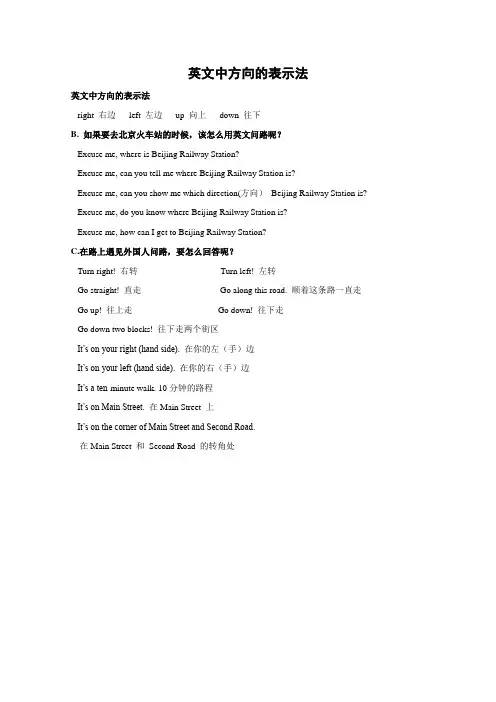
英文中方向的表示法
英文中方向的表示法
right 右边left 左边up 向上down 往下
B. 如果要去北京火车站的时候,该怎么用英文问路呢?
Excuse me, where is Beijing Railway Station?
Excuse me, can you tell me where Beijing Railway Station is?
Excuse me, can you show me which direction(方向)Beijing Railway Station is? Excuse me, do you know where Beijing Railway Station is?
Excuse me, how can I get to Beijing Railway Station?
C.在路上遇见外国人问路,要怎么回答呢?
Turn right! 右转 Turn left! 左转
Go straight! 直走 Go along this road. 顺着这条路一直走Go up! 往上走 Go down! 往下走
Go down two blocks! 往下走两个街区
It’s on your right (hand side). 在你的左(手)边
It’s on your left (hand side). 在你的右(手)边
It’s a ten-minute walk. 10分钟的路程
It’s on Main Street. 在Main Street 上
It’s on the corner of Main Street and Second Road.
在Main Street 和Second Road 的转角处。
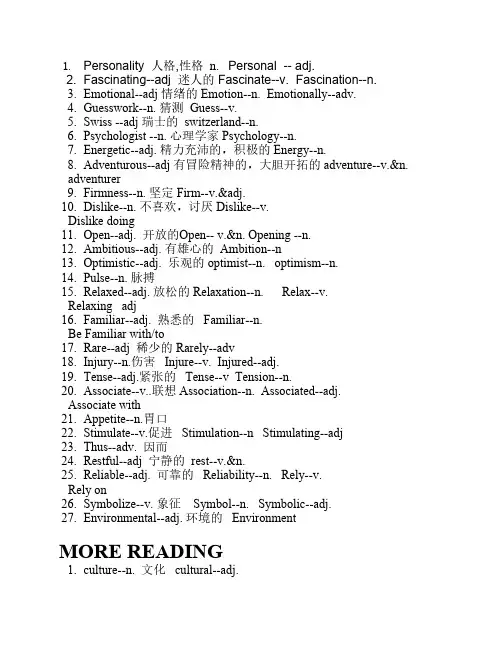
1. Personality 人格,性格 n. Personal -- adj.2. Fascinating--adj 迷人的 Fascinate--v. Fascination--n.3. Emotional--adj 情绪的 Emotion--n. Emotionally--adv.4. Guesswork--n. 猜测 Guess--v.5. Swiss --adj 瑞士的 switzerland--n.6. Psychologist --n. 心理学家 Psychology--n.7. Energetic--adj. 精力充沛的,积极的 Energy--n.8. Adventurous--adj 有冒险精神的,大胆开拓的 adventure--v.&n. adventurer9. Firmness--n. 坚定 Firm--v.&adj.10. Dislike--n. 不喜欢,讨厌 Dislike--v.Dislike doing11. Open--adj. 开放的Open-- v.&n. Opening --n.12. Ambitious--adj. 有雄心的 Ambition--n13. Optimistic--adj. 乐观的 optimist--n. optimism--n.14. Pulse--n. 脉搏15. Relaxed--adj. 放松的 Relaxation--n. Relax--v.Relaxing adj16. Familiar--adj. 熟悉的 Familiar--n.Be Familiar with/to17. Rare--adj 稀少的 Rarely--adv18. Injury--n.伤害 Injure--v. Injured--adj.19. Tense--adj.紧张的 Tense--v Tension--n.20. Associate--v..联想 Association--n. Associated--adj.Associate with21. Appetite--n.胃口22. Stimulate--v.促进 Stimulation--n Stimulating--adj23. Thus--adv. 因而24. Restful--adj 宁静的 rest--v.&n.25. Reliable--adj. 可靠的 Reliability--n. Rely--v.Rely on26. Symbolize--v. 象征 Symbol--n. Symbolic--adj.27. Environmental--adj. 环境的 EnvironmentMORE READING1. culture--n. 文化 cultural--adj.2. Association--n..联想 Associate--v.3. Depend--v. 依靠 Dependence--n. Dependent--adj.Depend on4. Wedding--n.婚礼5. Wrap--v.包装 wrapping--n&adj. Wrapper--n.6. Essential--adj 本质的 essentially--adv. Essence--n.7. Circumstance--n.环境 Circumstantial--adj.8. Offend--v冒犯 offence--n.9. Embarrass--v. 是窘迫 Embarrassing--adj. Embarrassment--n.10. Prosperity--n.繁荣 prosperous--adj.11. Funeral--n.葬礼12. Shed--v. 使落下13. Mourning--n.哀悼 Mourn--v. Mournful--adj.Be Mourning for sth/sb14. Bride--n. 新娘 bridegroom--n.15. Virtue--n.美德 virtuous--adj.16. Purity--n.纯净的 pure--adj. Purify--v.17. Formal--adj 正式的 Informal--ant Formally--adv.18. Smart--adj.光鲜的19. Brazil--n.巴西 brazilian--n&adj.20. Purple--n. 紫色 Purple--adj21. Unpack--v.打开(箱包)取出 pack--ant.。
$presenter[pri'zent2]n.推荐者;赠送者;(电视、广播的)主持人$suffer['s3f2]v.(from)受痛苦,患病;受损失;遭受;忍受$suffer for[]受损失,吃亏受罚$suffer from[]患(病);受…之害$head to head[]adv.交头接耳地$former['f0:m2]a.在前的:前任 n.(两种事物中的)前者$in former times[]从前$compliment['k0mplim2nt]n.(pl.)问候;赞美之词 vt.赞美;向…致意$give/present my compliments to[]请向…致意(问候)$make/pay a compliment to[]向…致意(问候)$cosmetic[k0z'metik]n.化妆品 a.化妆用的;装门面的;装饰性的$surgery['s2:d72ri]n.外科,外科手术;手术室,诊所$cosmetic surgery[]n.整容外科(手术)$emphasis['emf2sis]n. 强调,加强,重要,强语气$speak with emphasis[]强调地说$give emphasis to[]着重,强调$anorexia[9n2'reksi2]n.厌食症$current['k3r2nt]a.流行的;当今的;通用的n.水(气)流;电流$current events[]时事$current money[]通用的货币$the current of events[]事情的进展$the current of time[]时势,时代潮流$a current of air[]空气流$historian[his't0:ri2n]n.an expert in history 历史学家$perspective[p2:'spektiv]n.透视,透视画法;远景,展望;观点,看法$see things in perspective[]正确观察事物$a perspective glass[]望远镜$horrendous[h0'rend2s]a.可怕的,令人惊惧的$in quotes[]在引号中$rib[rib]n.肋骨,肋状物$the rib of an umbrella[]伞骨$waist[weist]n.腰(部);衣服的腰部$strip to the waist[]打赤膊,光膀子$tribe[traib]n.种族,部落;(植物,动物)族,类$a tribe of graduate students[]一帮毕业生$lobe[loub]n.耳垂,(肺,肝等的)叶$skull[sk3l]n.头盖骨,颅骨$a bald skull[]秃顶$an empty skull[]头脑空空$endure[in'dju2]vt.&vi.忍受,忍耐;持久,持续$ridiculous[ri'dikjul2s]a.荒谬的,可笑的;荒唐的$quaint[kweint]a.古雅的,离奇有趣的,奇怪的$trend[trend]n.倾向,趋势 v.伸向,倾向$set the trend[](在风尚、式样上)开个头,带个头$trend towards[]伸向,转向,趋向,倾向$breast[brest]n.胸脯,乳房;胸部 vt.挺胸迎…而上$a troubled breast[]心烦意乱$at the breast[]吃奶的$breast the tape[](赛跑者)以胸碰触终点线$implant[im'pl1:nt]vt.注入,植入,灌输$implant in the mind[]使怀抱希望$a dental implant[]牙齿的植入$face-lift[]翻新门面,作整形手术$transplant[tr9ns'pla:nt]n./v.移植,移种;人工移植(心,胃);迁移$issue['i6u:]n.问题;(书刊的)期号 vt.发行,颁布,出版$at issue[]在争论中;有分歧;待裁决的;$in issue[]在争论中;结果,结局$issue from[]由…引起;产生于$issue an order[]发布命令$issue a statement[]发表声明$corset['k0:sit]n.妇女紧身胸衣$internal organs[]内脏$surgeon['s2:d72n]n.外科医生,军医,船上的医生$suck[s3k]v.&n.吸,舐;吸收(取)$suck out[]吸出$scheme[ski:m]n.a plan for doing sth 计划,规划;诡计$color scheme[]色彩搭配$infinitive[in'finitiv]n.(动词)不定式$detest[di'test]vt.痛恨, 憎恶$detest evil[]嫉恶如仇$slim[slim]a.苗条的;薄的;小的 v.减轻体重,变苗条$intransitive[in'tr9nsitiv]a.(动词)不及物的$an intransitive verb[]不及物动词$beholder[]n.观者,目击者$peacock['pi:k0k]n.(雄)孔雀 vi.炫耀$play the peacock[]炫耀自己$loveliness['l3vlinis]n.美丽,可爱,魅力$irrelevant[i'rel2v2nt]a.不相干的,离题的,与…不相干$an irrelevant comment[]一句不相干的评语$pierce[pi2s]vt./vi.刺穿,戳人;(喻)寒冷刺骨;感动$tattoo[t2'tu:]n.纹身,(皮肤上的)刺花纹 vt.刺花纹于$curler['k2:l2]n.卷发夹;卷发杠子;卷发的人$cream[kri:m]n.奶油,乳酪,(护肤)面霜vt.搅成糊状$chocolate cream[]巧克力酱;奶油夹心巧克力$cold cream[]雪花膏$furniture cream[]家具蜡$aerobic[/2'roubik]n.有氧运动法 a.增氧健身法的;有氧的$cigar[si'ga:]n.雪茄烟,叶卷烟$appetite['9pitait]n.食欲,胃口;欲望,性欲;爱好,趣味$to lose one's appetite[]食欲不振$an appetite for learning[]求知欲(嗜好学习)$get up one's appetite[]开胃,增进食欲;做刺激胃口的事$have an appetite for[]爱好$to sb's appetite[]合某人的口味/心意$lipstick['lipstik]n.唇膏,口红$cheetah['t6i:t2]n.猎豹$sunbathe['s3n'be5]vi.沐日光浴$bend[bend]n.弯曲 vt.使弯曲,使屈从 vi.弯曲,屈身$heel[hi:l]n.踵,鞋后跟;(鞋、袜等的)后跟$shoes with high heels[]高跟鞋$shark[6a:k]n.鲨鱼;骗子,敲诈勒索者$sun-tan oil[]防晒油$beneficial['beni'fi62l]a.有益的,有用的,有好处的$be beneficial to[]有利于,有益于$beneficial birds/insects[]益鸟/益虫$productive[pr2'd3ktiv]a.多产的,(土地)肥沃的;有收获的$rhythmic['ri5mik]a. 有节奏的,有韵律的$in nature[]本质上;实际上$wire['wai2]n.金属线,电线;电报,电信 v.发电报(给)$ketchup['ket62p]n.调味番茄酱$catsup['k9ts2p]n. esp.AmE:调味番茄酱$bride[braid]n.新娘$bridegroom['braidgrum]n.新郎$psychologist[sai'k0l2d7ist]n.心理学家;心理学者$adventurous[2d'vent62r2s]a.爱冒险的;惊心动魄的,惊险的,刺激的$optimist[-mist]n.乐观的人,乐观主义者$pessimist[-mist]n.悲观的人,悲观主义者$associate[2's2u6ieit]n.(某些美国高等专科学校授予的)准学士学位$tense[tens]vt./vi.拉紧,(使)紧张 a.绷紧的,紧张的$restful['restful]a.宁静的;使人感到平静的;休息充足的$restfully[]adv.宁静地;休息充足地$restfulness[]n.宁静$conservative[k2n's2:v2tiv]a.保守的;小心谨慎的;防腐的 n.保守的人$conservatively[]adv.保守地$conservativeness[]n.保守$funeral['fju:n2r2l]n.葬礼,丧礼,丧葬$mourner['m0:n2]n.悲叹的人;哀悼者;忏悔者$collar['k0l2]n.衣领;(动物的)项圈 vt.(非正式)抓住$pharmacy['fa:m2si]n.制药,配药;药房;药店$nuclear pharmacy[]核药学$herald['her2ld]n.(旧时的)传令官;预兆 vt.预示…的来临$sculpture['sk3lpt62]n.雕塑(品);雕刻(术)vt.雕刻,雕塑,刻蚀$sculptural['sk3lpt62r2l]a.雕刻的$sculpturally[]adv.雕刻地$stun[st3n]vt.使…失去知觉;使目瞪口呆,使吃惊$trademark['treidm1:k]n.商标;标志,特征 vt.贴上商标,登记商标$darkroom['d1:k'rum](冲洗底片的)暗室,暗房dialect['dai2lekt]n.方言,某地方的语言dialectal[dai2'lektl]adj.方言的dialectally[]adv.土话地gene[d7i:n]n.基因,遗传因子petunia[pi'tju:nj2]n.[植]矮牵牛花undoubtedly[]ad.不容置疑地,肯定地stir[st2:]vt.搅动,摇动 vi.轻微地移动 n.搅动,摆动paste[peist]n.浆湖 v.粘,贴,裱糊,涂抹lottery['lat2ri]n.碰巧(冒险)之事,碰运气;彩票routine[ru:'ti:n]n.日常工作 a.日常的;例行的;常规的the day's routine[]=daily routine:日常工作cement[si'ment]n.水泥;胶泥,胶接剂 v.胶合;巩固,加强cylinder['silind2]n.圆筒,圆柱体;汽缸spacious['spei62s]adj.广阔的,宽敞的spaciously[]adv.宽敞地;广博地spaciousness[]n.宽敞chin[t6in]n.下巴,下颊chef[6ef]n.厨师,厨师长anchor['98k2]n./v.锚;危难时可依靠的人或物;用锚泊船parachute['p9r26u:t]n.降落伞 v.用降落伞投送/降落procedure[pr2'si:d72]n.常规;程序;手续;步骤legal procedure[]诉讼程序crayon['krei2n]n.彩色笔,粉笔或其绘画vt.用粉(蜡)笔画compound['k0mpaund, k2m'paund]a.复合的,合成的 n.化合物;复合词(句) compound substance[]合成物质vivid['vivid]a.生动的,鲜明的, 大胆的,清晰的,活泼的vividly[]ad.清楚地,鲜明地,生动地vividness[]n.生动(性) vigour['vig2]=vigor n.智力,体力,精力curtain['k2:tn]n.窗帘,幕布(常和the连用) aquarium[2'kw/ri2m]n.水族馆;养鱼池endanger[in'deind72]vt.危及,使遭危险;危害campaign[k9m'pein]n.战役,运动;竞选运动 vi.领导,发起运动enter upon a campaign[]发动运动,走上征途on campaign[]出征,从军smear(ing) campaign[](借散布谣言等)损毁他人名誉的运动whispering campaign[]私下传谣诽谤个人/组织的活动(针对候选人continent['k0ntin2nt]n.大陆,洲;(不包括英国的)欧洲大陆continent['k0ntin2nt]adj.自制的,克制的;节欲的adaptable[2'd9pt2bl]a.能适应的,适应性强的;可改编的plain[plein]a.朴素的,简单的;清晰的,明白的 n.平原arctic['a:ktik]a.北极(区)的 n.[the A-]北极,北极圈resemble[ri'zembl]vt. 相似,类似,象domestic[d2'mestik]a.国内的,本国的;家庭的,家用的;驯养的mammal['m9ml]n.哺乳动物aquatic[2'kw9tik]a.水产的;(运行)水上的aquatic mammal[]水栖哺乳动物marine[m2'ri:n]a.海的;海生的;航海的;海事的 n.水兵marine mammal[]海洋哺乳动物moose[mu:s]n.[动]麋;驼鹿musk[m3sk]n.麝香;麝;麝香的香气oxen['0ksn]ox的复数berry['beri]n.浆果(如草莓等);(鱼或龙虾的)卵cub[k3b]n.幼兽,年轻无经验的人cub pilot[]见习领港员cub reporter[]初出茅庐的记者unlicked cub[]没礼貌的年轻人;粗野的少年;乳臭未干孩harm[ha:m]n.伤害,损害 vt.损害;伤害do no harm[]无害do sb/sth harm[]=do harm to sb/sth 对…有害mean no harm[]没有恶意no harm done[]没人受伤害,均平安无事cease[si:s]vi.&vi.&n.停止,停息publicity[p3b'lisiti]n.宣传,宣扬;宣传品,广告;公众的注意seize[si:z]v.抓住,逮住;夺取,占领;没收,查封seize up[][机器、部件]轧住,卡住,失灵wildlife['waildlaif]n.野生动物;野生植物;野生生物binocular[bi'n0kjul2]adj.双眼并用的,双筒望远镜的binoculars[][复数]n.双筒望远镜key-ring[]钥匙圈silver['silv2]n.银,银币 a.银色的,清亮的 v.镀银brooch[br2ut6]n.胸针或领针contribution['k0ntri'bju:62n]n.捐助;贡献;捐助的东西(如钱);投稿mug[m3g]n.(有柄的)大茶杯;脸;蠢才 v.行凶抢劫a beer-mug[]啤酒杯a mug of milk[]一大杯牛奶habitual[h2'bit6u2l]a.习惯性的,习以为常的;惯常的;常见的a habitual thief[]惯偷congestion[k2n'd7est62n]n.拥挤;阻塞;充血ivory['aiv2ri]n.象牙;牙质 a.象牙制成的;似象牙的fossil ivory[]古代巨象的牙化石dental ivory[]牙质ornament['0:n2m2nt, '0:n2ment]n.装饰,点缀;装饰品 v.装饰,美化disco['diskou]n.迪斯科舞曲(或舞会、舞厅) wardrobe['w0:dr2ub]n.衣柜,衣橱,全部服装;剧服,行头a spring wardrobe[]春装a new summer wardrobe[]全新夏装a wardrobe dealer[]旧衣商mangrove['m98grouv]n.[植]红树swamp[sw0mp]n.沼泽,湿地 vt.浸没;使…穷于应付swampland[]n.沼泽地swampglider[]一种以飞机螺旋浆推进的平底小船swampweed[]n.沼生草marina[m2'rin2]n.散步道;(供游艇停泊的)小港,码头reclaim[ri'kleim]v.开垦,开拓;改造,感化;(废物)回收reclaim sb from vice[]使某人改邪归正reserve[ri'z2:v]vt.保留,储备;预定 n.储备(物),预备队reserve of food[]食物储备luxury['l3k62ri]n.难得享受到的愉悦;奢侈,奢华的生活villa['vil2]n.别墅;[英]郊区住宅facility[f2'siliti]n.灵巧,熟练;[pl.]设备,设施,便利条件prosperous['pr0sp2r2s]a.成功的,繁盛的,顺利的,幸运的a prosperous business[]兴旺的事业prosperous leaves[]茂盛的树叶employment[im'pl0im2nt]n.雇用;使用;工作,职业chairperson[]n.主席(无性别之分),议长,董事长,会长conservation['k0ns2(:)'vei62n]n.保存,保护;节约(自然资源)conservationist[-nist]n.自然资源保护论者distinguish[dis'ti8gwi6]v.(from)区别,辨别;辨认出;使杰出distinguishing[di'sti8gwi6i8]a.有区别的orthodontic[]n.整牙学brace[breis]n.支柱,牙齿矫正 vt.支柱,撑牢;使奋起orthodontist[]n.牙齿矫正医师psychology[sai'k0l2d7i]n.心理学,心理状态nap[n9p]n.(白天)打瞌睡,打盹 vi.午睡;打盹afterwards['a:ft2w2dz]ad.以后,后来,然后martial['ma:62l]a.战争的;军事的martial law[]军事管制(戒严)martially[]adv.好战地;勇敢地martialize['ma:62laiz]vt.使变得好战;使变得勇敢;使军事化martialism['ma:62liz2m]n.尚武martialist[]n.战士,武道家squatter['skw0t2]n.蹲着的人;擅自占住空房的人;vi.涉水过squat[skw0t]n.蹲坐 a.矮胖的,蹲着的;v.蹲坐,蹲伏resettlement[]n.再定居,重新安置resettle oneself[]再坐下来resettle['ri:'setl]vt.再安顿;再建立;使在新地方(重)定居promotion[pr2'm2u62n]n.促进;提升;创设;举办;宣传;推销get/obtain promotion[]升级promotion of friendship[]友谊的增进foreign trade promotion[]促进对外贸易a promotion worker[]推销员be on one's promotion[]有希望提升,为提升而小心谨慎,洁身自爱promotional[pr2'mou62nl]a.增进的,奖励的;推销的tragic['tr9d7ik]a.悲剧的,悲剧性的;悲惨的,可悲的distract[dis'tr9kt]vt.分散(注意,心思等);使人分心be distracted by/with[]被…搞得心烦意乱;被…搞得要发狂distract from[]使(人)分心,分散(注意力等)distractingly[di'str9kti8li]adv.精神涣散地,发狂似地distractive[dis'tr9ktiv]a.分散注意力的,扰乱的distractible[dis'tr9kt2bl]adj.易分心的,不专心的loyalty['l0i2lti]n.忠诚,忠心,忠贞loyal['l0i2l]a.(to)忠诚的,忠贞的be loyal to a cause[]忠于事业loyalism['l0i2lizm]n.效忠,忠诚loyalize[]vt.使忠诚;使效忠loyally['l0i2li]ad.忠诚地reluctant[ri'l3kt2nt]a.不情愿的,勉强的reluctant to help[]不情愿帮忙a reluctant smile[]勉强的微笑reluctantly[]ad.不高兴地,勉勉强强地disobey['dis2'bei]v.不服从;不听命令disobey the rules[]违抗规定disobeyal[]n.不顺从disobeyer[]n.反抗的人brilliant['brilj2nt]a.光辉的,灿烂的,明亮的;杰出的,辉煌的a brilliant color[]鲜明的颜色brilliantly['brilj2ntli]adv.灿烂地;亮闪闪地futuristic[fju:t62'ristik]a.未来的,未来派(艺术)的,未来主义的futuristic decor[]未来主义装饰futuristic computer software[]领先时代的电脑软件spine-chilling[]a.惊险的,令人毛骨悚然的spectacular[spek't9kjul2]n.引人入胜的节目 a.壮观的,引人注目的in a spectacular fashion[]惊人地,壮观地spectacularity[]n.壮观,壮丽,引人注目epic['epik]n.史诗,叙事诗 a.史诗般的,壮丽的an epic deed[]英雄事迹sci-fi[]n.科幻小说 a.科幻的;关于或类似于科幻的a sci-fi weapons system[]科幻武器系统imply[im'plai]vt. 暗示,意味attitude['9titju:d]n.态度,看法(to, toward, about);姿势enthusiasm[in'4ju:zi9z2m]n.热情,激情;巨大兴趣(for);热衷的事物arouse enthusiasm in sb[]引起某人的兴趣arouse the enthusiasm of[]激发…的积极性be full of enthusiasm about[]热衷于be in enthusiasm[]怀有热情feel no enthusiam for/about[]对某事不热心/没有兴趣overflow with enthusiasm[]热情洋溢with enthusiam[]热情/烈地enthusiasm for[]…热,…狂chronological['kr0n2'l0d7ikl]adj.按时间前后顺序的chronologically[]ad. 按年代的chronological order[]年代顺序similarity['simi'l9riti]n.相似,类似;相似之处,类似点flow chart[]流程图,生产过程图解conditional[k2n'di62nl]adj.依赖条件的;有条件的;引起条件反应的be conditional on/upon[]在…条件下,取决于intercity[int2'siti]城市间的script[skript]n.剧本(原稿);手稿,原稿;考生的笔试卷consequently['k0nsikw2ntli]ad.结果,因此,所以dwarf[dw0:f]n.矮子,侏儒,矮小的动植物 vt.使…矮小dwarfish['dw0:fi6]a.像侏儒的,矮小的dwarfishness[]n.矮小jealous['d7el2s]a.妒忌的,羡慕的;猜疑的,唯恐失去的with jealous care[]小心翼翼地be jealous of sb's fame[]妒忌某人的名声jealously[]ad.嫉妒的,猜疑的jealousness[]n.嫉妒,猜疑nomination['n0mi'nei62n]n.提名(权);任命(权) gap[g9p]n.缝隙;缺口;漏洞;(意见、个性等的)差异communications gap[]思想隔阂,感情隔阂gapped[]a.豁裂的,有缺口的gappy['g9pi]a.有裂口的,破裂的;空白的approach[2'pr2ut6]v.靠近,接近n.接近;途径,入门;方式,方法the approach of night[]夜幕降临tolerance['t0l2r2ns]n.忍受,容忍;耐力,坚韧性imperfection[imp2'fek62n]n.不完美,缺陷;瑕疵generate['d7en2reit]vt.引起,导致;使发生,产生(光、热等) generated[]a.生成的offspring['0(:)fspri8]n.子女,后代;(动物的)崽;(植物的)幼苗harmony['ha:m2ni]n.调合,协调;和睦,和平相处;(音乐)和声be in harmony with[]与…协调一致be out of harmony with[]与…不协调一致live in harmony[]和睦相处thrive[4raiv]v.兴旺,繁荣,茁壮成长shadow['69d2u]n.阴影;阴暗,影像,庇护vt.投阴影于;跟踪a shadow cabinet[]影子内阁be afraid of one's own shadow[]胆小,胆怯;神经过敏shadowy['69d2ui]adj.有阴影的,模糊的,多荫的,阴凉的orchid['0rkid]n.兰花;淡紫色impatient[im'pei62nt]a.缺乏耐心的;渴望的,焦急的,急不可待的selfish['selfi6]adj.自私的,利己的foresee[f0:'si:]v.(foresaw,foreseen)预见;预知to foresee trouble[]预见到有问题consequence['k0nsikw2ns]n.结果,后果,影响;重要性,要紧(和of连) obese[2u'bi:s]a.过度肥胖的,肥大的obeseness[]n.肥胖obesity[ou'bi:siti]n.肥胖(症) vital['vaitl]a.生死攸关的;致命的;极其重要的;有生命的vitals['vaitlz]n.主要部件;(人体的)重要器官a vital examination[]至关重要的考试a vital organ[]要害器官growl[graul]v.(狗等)嗥叫,(炮等)轰鸣 n.嗥叫,轰鸣finger['fi8g2]n.手指;指状物,查找器 vt.用指触摸,抚摸keep one's fingers crossed[]祈求好运,祝成功pull one's fingers out[]开始努力工作flash[fl96]vt.&vi.闪出亮光,掠过,闪现 n.闪现的亮光flash in the pan[]昙花一现in a flash[]转眼间,突然间,即刻,一瞬间apart[2'pa:t]ad.分离,离开,隔开 a.分离的,分隔的apart from[]除…之外(别无);除…之外(尚有) hydro-electric[]a.水力发电的profit['pr0fit]n.利润,收益 v.得利,获益;利用;有利于dust[d3st]n.尘土;垃圾,废品 vt.去掉…的灰尘throw dust in sb's eyes[]欺骗某人dust down[]掸掉灰尘dust off[]弄掉…灰尘;开始练习mighty['maiti]n. 有势力的人mighty['maiti]adv.很,非常high and mighty[]趾高气扬的;位高权大的;骄傲自大的doom[du:m]n.命运,厄运;绝望 vt.注定,命定;判决to go to one's doom[]走向毁灭be doomed to[]注定要origin['0rid7in]n.起源;起因;[pl.]出身,血统;产地gotta['g0t2]=have got to 必须botanist['b0t2nist]n.专门研究植物的人;植物学家quotation[kw2u'tei62n]n.引文,引语;(交易)报价,时价;行情previous['pri:vj2s]a.以前的;(to)在…之前;过急的pier[pi2]n.(向水中伸出的)码头;突堤scarce[sk/2s]a.缺乏的, 不足的, 稀有的, 不充足的make oneself scarce[]悄悄走(躲)开;隐退;离去;溜掉curly['k2:li]adj.卷曲的,波浪式的mechanical[mi'k9nik2l]a.机械(学)的;力学的;机械似的;手工操作的mole[m2ul]n.鼹鼠,田鼠;【医】胎记;黑痣forehead['f0rid, 'f0:hed]n.额头,前部chin[t6in]n.下巴,下颊keep your chin up![]振作点!chin[t6in]vt.用下巴夹住;引体向上使下巴高出横杠moustache[m2s'ta:6]n.髭,小胡子;(哺乳动物的)触须old moustache[]老兵,有经验的士兵beard[bi2d]n.(下巴上的)胡须,络腮胡子wear a beard[]留着胡须jewel['d7u:2l]n.宝石 vt.镶以宝石alien['eilj2n]n.外侨;外星人 a.与…相反的;外国(人)的filthy['fil4i]a.卑劣的;恶劣的;肮脏的;淫秽的threat[4ret]n.恐吓,威胁;坏兆头,危险迹象ozone['ouzoun]n.臭氧;(海岸等的)新鲜空气ozone layer[]臭氧层(距地表20…40英里,同温层的外缘)Antarctic[9nt'1:ktik]a.南极(区)的 n.[the A-]南极洲,南极(圈) CFCs[]n.chlorofluorocarbon 氟氯化碳atmosphere['9tm2sfi2]n.大气(层);空气;气氛,环境;大气压aerosol['/2r2s0l]n.悬浮尘粒;气溶胶;烟雾剂;喷雾器refrigerator[ri'frid72reit2]n.fridge 冰箱,冷藏库,冷冻机label['leibl]n.标签 v.把…称为;用标签于;用标签标明spray[sprei]n.水花;喷雾 vt.喷;喷涂 vi.喷;溅散deodorant[di:'oud2r2nt]n.除臭剂 a.除臭的Greenpeace[]绿色和平组织(保护动物不遭捕猎的组织)pigeon[pid7in]n.鸽子shrimp[6rimp]n.(小)虾,河虾,褐虾;无足轻重的人accountancy[2'kaunt2nsi]n.会计工作,会计学karaoke[]n.卡拉OK poetry['p2uitri]n.诗;诗歌;诗作deserve[di'z2:v]vt.应当(受到),值得deserve ill/well,better/of[]有罪/功于rightly deserve[]完全应得(惩罚)gallery['g9l2ri]n.画廊,美术陈列馆;长廊;(采矿)坑道the press gallery[]记者席the public gallery[]旁听席bring down the gallery/house[]博得全场喝采fame[feim]n.名声,名望ill fame[]恶名;丑名undying fame[]不朽之名be famed for[]以…出名come to fame[]成名peal sb's fame[]鼓吹某人的声誉priest[pri:st]n.教士,牧师,神父priestess[pri:stis]女性牧师missionary['mi62n2ri]a.教会的,传教(士)的 n.传教士Belgium['beld72m]比利时(西欧国家) superior[sju:'pi2ri2]a.较高的;优越的n.上级;较好的人或事物with a superior air[]态度傲慢地be superior to[]比…更优越;胜过;不为...所动/屈服be superior to temptation[]不受引诱be superior to hardships[]不屈服于艰难困苦rise superior to[]不受…的影响;超越abandon[2'b9nd2n]vt. 放弃,沉溺abandon oneself to[]沉湎于,陷入sane[sein]a.心智健全的,神志清醒的;明智的,理智的abstract['9bstr9kt]a.抽象的 n.摘要,梗概 vt.提取;摘录要点emotion[i'm2u62n]n.感情,激情;情感;激动emotionless[i'mou62nlis]a.没有感情的,冷漠的with emotion[]感动地,激动地rare[r/2]a.稀薄的,稀疏的;稀有的,难得的,珍奇的a rare bird[]珍禽rare metals[]稀有金属decade['dekeid]n.十年;十个(天) for decades on end[]数十年如一日excusing[iks'kju:zi8]a.辩辞的,辩解的confusion[k2n'fju:72n]n.辨别不清;混淆,骚乱;混乱confusion of ideas[]观念混乱paintbrush['peintbr36]画笔;漆刷;画刷sketch[sket6]n.素描;略图;梗概 v.绘略图,速写,写生sketch map[]略图,示意图character sketch[]人物素描,人物简评sketch out proposals for[]草拟…建议sketch plan[]草拟计划sculptor['sk3lpt2]n.雕刻家,雕刻家carving['ka:vi8]n.雕刻(术);雕刻品porcelain carving[]瓷雕shell carving[]贝雕steadily['stedili]adv.firmly, unwavingly 坚定地,有规则地Hungarian[h38'g/2ri2n]adj.匈牙利的;n.匈牙利人puppet['p3pit]n.(木偶戏用的)木偶,玩偶;傀儡debit['debit]n.(帐簿中的)借方 vt.把…记入借方cash debit[]现金收入assumption[2's3mp62n]n.假定,设想;采取;承担graffito[gr9'fi:tou]n.乱画,粗糙雕刻genuine['d7enjuin]a.真正的,名副其实的;真诚的,坦率的vandal['v9nd2l]n.故意破坏他人或公共财产者;野蛮人vandalism['v9ndlizm]n.(对建筑、自然美等的)恶意破坏,蛮行priority[prai'0riti]n.先,前,优先;优先考虑的事物,优(先)权establish an order of priority[]按重要性确定...的次序according to priority[]依次give (first) priority to[]给…以(最)优先权take priority of[]比…居先;得…优先权complex['k0mpleks]a.复合的;错综复杂的 n.综合体,复合体rattan[r9't9n]n.藤条,藤杖rattan rope[]藤索saucer['s0:s2]n.(茶杯的)茶托,碟monster['m0nst2]n.怪物,巨兽;极丑陋的人,恶人green-eyed monster[]绿眼的妖魔(指妒忌)swiftlet['swiftlit]n.【鸟】金丝燕cave[keiv]n.穴;窑洞 v.(使)凹陷cave-man[]n.穴居人,野人investor[in'vest2]n.投资人,投资商。